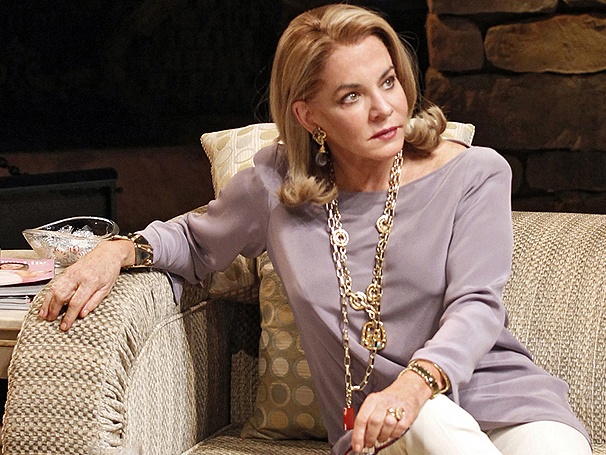The play takes place mostly in 2004, as the Iraq War was starting to ramp up, and the tension between Polly and Lyman Wyeth (the very Republican parents, played by Stockard Channing and Stacy Keach) and their two children, Brooke (Elizabeth Marvel) and Trip (Matthew Risch) is palpable from the first scene. The stakes (and the tension) only go up when it turns out that Brooke, whose first novel was a big success but who has suffered from writer's block in the years since, has written a memoir of the family, focusing on her long-dead brother, about whom no one has been allowed to speak.
The family (including alcoholic Aunt Silda, played by Judith Light) has gathered in their Palm Springs home (a brilliant set by the virtually-always brilliant John Lee Beatty) for Christmas. Even though they're Jewish. Brooke has flown in from Sag Harbor ("Living on the East Coast has led you to believe sarcasm is both charming and alluring," her mother says), bringing with her the manuscript for her unpublished (but already sold) book. The family assumes it's another novel, but like so many assumptions people make, this is wrong. When the family learns her real plan, everything starts falling apart. But in a good way. At least for the audience.
Telling the truth can be an expensive proposition, and it certainly is for the Wyeth family, at least in terms of their emotions. Stockard Channing is stunning as the matriarch who watches what she feels she's built over decades fall apart in the course of a day or so. Stacy Keach gives a performance that is a great match for Channing. (I loved the bit when his character - a movie star turned politician - shows just how easy it is for him to die convincingly.) Marvel, Light and Risch all do great jobs, as well. In fact, I can't find much to criticize about "Other Desert Cities," other than wishing it had gone on a bit longer. I'd love to see how this family is changed by the revelations made in the shadow of their gold-flocked Christmas tree.


No comments:
Post a Comment